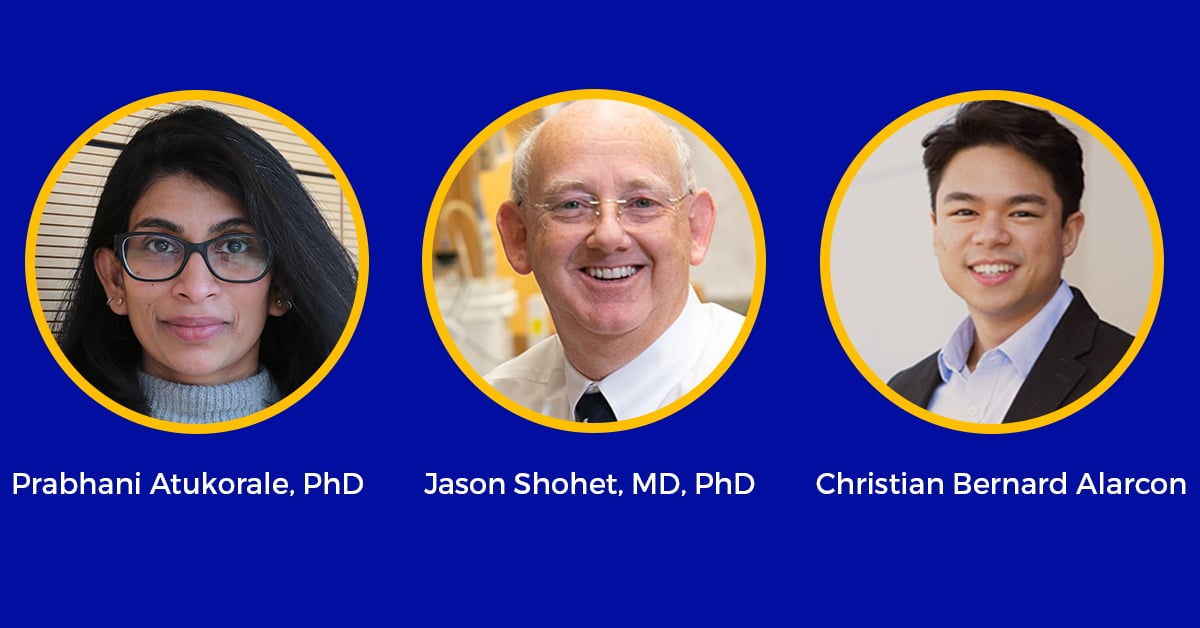
This summer, while Prabhani Atukorale, PhD, and Jason Shohet, MD, PhD, are busy developing treatments for high-risk neuroblastoma, they will have some help. Christian Bernard Alarcon, a medical student at Kansas City University, College of Osteopathic Medicine received a grant from the Alex’s Lemonade Stand Foundation (ALSF) Pediatric Oncology Student Training (POST) Program to train with these two investigators on their ALSF-funded Innovation Award. The project focuses on developing nanoparticle-based immunotherapies to harness the immune system, empowering it to conquer neuroblastoma—a type of pediatric cancer that develops in the peripheral nervous system and typically affects infants and children less than five years of age.
We're all aware of the remarkable power of immunotherapy, but its monumental success in blood cancers has not yet translated to solid cancers, such as neuroblastoma.
"Even with chemotherapy doses at maximally tolerated doses, we are only achieving 50% survival. Furthermore, we know that this highly toxic treatment will have significant long-term side effects in all children who survive,” says Dr. Shohet.
When someone has cancer, their immune system attempts to hunt down tumor cells and kill them—but this process sometimes goes awry. Cancer can often outwit its opponents, finding ways to evade the immune system. To make matters worse, although cells surrounding the tumors (referred to as the tumor microenvironment or TME) can initially fight back, over time tumor cells can sometimes gain an advantage, forcing immune cells to fight for the wrong side.
Immunotherapies usually focus on boosting the adaptive immune system, helping it launch the T cells necessary to fend off cancer. However, this approach which has been successful for leukemias still needs to be improved for solid tumors such as neuroblastoma since these tumors have a highly immunosuppressive TME that shuts down T cells and blocks other immune cells from recognizing the cancer cells as dangerous.
To counteract this problem, Drs. Atukorale and Shohet came up with an intriguing idea. They reasoned that engaging the innate immune system would increase the odds of bringing in adaptive T cells to eliminate cancer. To bring their plan to fruition, the team will engineer tiny drug carriers—or nanoparticles (NPs)—that will shuttle agonists of two synergistic innate immune pathways to the TME—1) stimulator of the interferon gene (STING) pathway and 2) toll-like receptor 4 (TLR4) pathway. Once reaching their target cells, these agonists will stimulate the production of type 1 interferons, a cytokine family that can powerfully activate innate immune cells and recruit large numbers of T cells to the TME.
We are optimistic that this approach will bring the immune system back to life.
The training program
This project will allow Alarcon to participate in all aspects of the study. He will perform surgeries to implant neuroblastoma tumors in mice, synthesize and ensure successful delivery of NPs, conduct flow cytometry to identify which cytokines are released, and use real-time in vivo bioluminescence to track changes in tumor burden. This latter process involves delivering engineered tumor cells to mice which when exposed to a substrate, emit light that is detectable with an optical imaging device.
Together the team will characterize the immune response and document how the TME evolves from an immunosuppressive ecosystem into one equipped to launch a relentless attack on cancer.
Paying it forward
Training the next generation is of paramount importance. The POST program will allow Alarcon to gain hands-on experience that will guide him as he continues through medical school and beyond. This project is ideal for Alarcon as he aspires to pursue a career in pediatric oncology and is especially interested in learning about minimally invasive treatment options. As NPs are such a therapy, they easily check that box. The study is well suited for a summer undertaking as it consists of manageable subtasks, of which many can be achieved over the summer months.
Alarcon will also be invited to contribute ideas that can be applied to future studies. This experience will pay spectacular dividends when Alarcon goes on to train his students and fellows in the future.
We are eager to welcome Christian Bernard Alarcon!